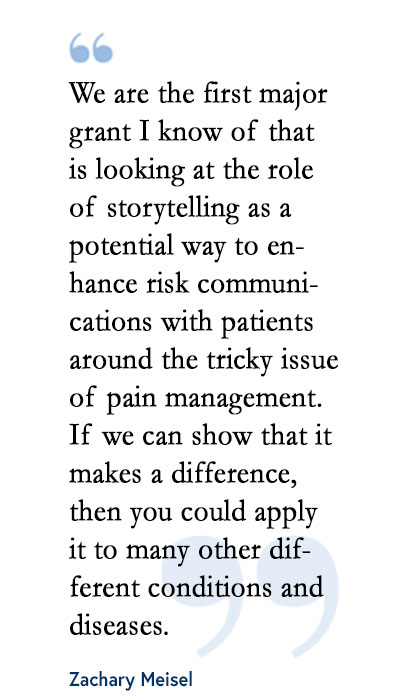Substance Use Disorder
News
Zachary Meisel Wins $2.1 Million PCORI Funding Award
36-Month Study to Focus on Opioid Risk Communications in Clinical Settings
University of Pennsylvania Assistant Professor of Emergency Medicine and LDI Senior Fellow Zachary Meisel, MD, has received a $2.1 million funding award from the Patient-Centered Outcomes Research Institute (PCORI).
The award will fund a 36-month comparative effectiveness study of enhanced opioid risk communication strategies for pain management following acute care. Meisel’s research team includes LDI Senior Fellows Carolyn Cannuscio, ScD, ScM; Marilyn Schapira, MD, MPH; Jeanmarie Perrone, MD; and Karin V. Rhodes, MD.

Created as part of the Affordable Care Act, PCORI is an independent, nonprofit organization that funds research to improve clinical practices, health care and health care decision making.
National epidemic
Prescription opioid addiction is now widely recognized as a national epidemic. The latest NIH National Institute on Drug Abuse estimates are that more than 2 million people are addicted to prescription opioid pain relievers and that the number of unintentional overdose deaths from these drugs has quadrupled since 1999.
The new study comes as federal and state health officials seek more effective ways to address the 19,000 prescription opioid deaths currently occurring across the U.S. each year.
The Department of Health and Human Services has emphasized the need to “stem the overprescribing of opioids by providing prescribers with access to the tools and education they need to make informed decisions.”

Physician-patient communication
A Meisel study goal is to develop and compare the effectiveness of communication tools that enable physicians and patients to more effectively score and understand the potential risk involved in the prescription of opioids for acute conditions like kidney stones and back pain.
“What we hear over and over again from physicians is that ‘it’s just easier’ to write the opioid prescription than spend half an hour explaining to the patient why we’re not giving them opioids,” said Meisel.
The tool would employ interactive questions, video narratives and a system that scores on a scale of 29 values enabling the patient to calculate their own level of opioid risk.
“We don’t think it will replace a conversation between the patient and provider,” Meisel explained. “But we think it can prime the pump and provide information that facilitates more effective communications between patient and provider with the patient starting with a better understanding of their own risk.”
Meisel noted the tool is likely to be educational for physicians as well. “The variability on [opioid prescribing] is all over the map,” he said. “For conditions like kidney stone and back pain, some doctors always prescribe opioids and some never prescribe them; some prescribe a short course, others a longer one. We think this kind of tool will help educate physicians about best practices — for instance, there’s good evidence that both opioids and non-opioids are equivalent in efficacy for kidney stone and back pain. And because non-opioids are safer, it’s probably a better choice.”
Unsettled question
“This project is also about testing the role of narrative vignettes in assisting the communication between patients and providers, which remains an unsettled question. It really hasn’t been explored as a way to do shared decision making or communication between patient and providers,” Meisel said. “We are the first major grant I know of that is looking at the role of storytelling as a potential way to enhance risk communications with patients around the tricky issue of pain management. If we can show that it makes a difference, then you could apply it to many other different conditions and diseases.”
An emergency physician at the Hospital of the University of Pennsylvania, Meisel is also Co-Director of the Penn Medicine Center for Emergency Care Policy Research. His health services research projects have focused on the emerging field of narrative medicine as well as emergency care access and utilization, patient safety, emergency medical services, and communication and dissemination.
Meisel is also the primary investigator and Director of the Policy and Dissemination Core of the Center for Health Economics Treatment Interventions for Substance Use Disorder (CHERISH), a new NIH-funded national research center launched in 2015.